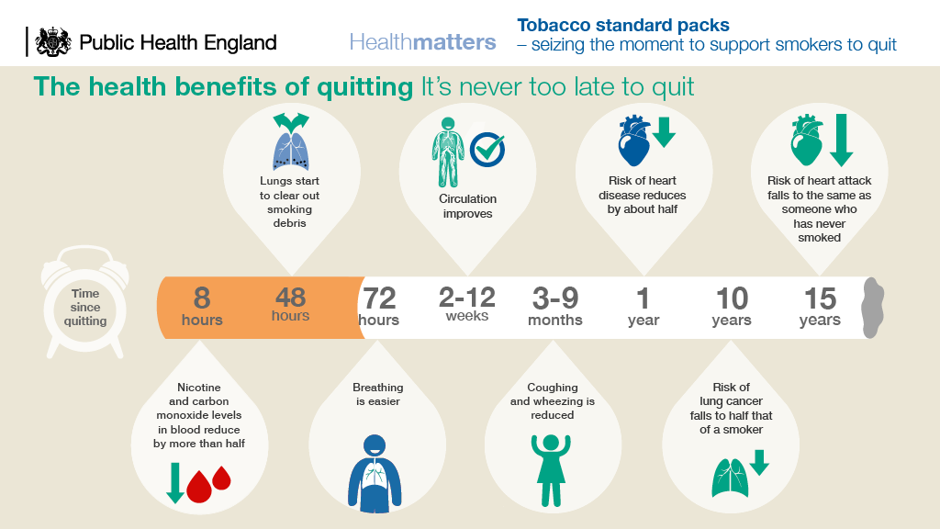No Smoking Day 2020: The benefits of quitting smoking and tips on how to stop
March 11th 2020, is National No Smoking Day. First held in 1984, national No Smoking Day is a health awareness day that encourages people around the world to quit smoking and raises awareness of the dangers of smoking and the health benefits of quitting.
According to the NHS, smoking is the biggest cause of preventable deaths in England, accounting for nearly 80,000 deaths each year. One in two smokers will die from a smoking-related disease.
Smoking increases your chances of having a stroke and having a heart attack by twice as much. IT also increases the chances of you developing a disease such as coronary heart disease, gum disease, stomach cancer, mouth and throat cancer, lung cancer, pneumonia, emphysema and chronic obstructive pulmonary disease (COPD). Smoking causes 84% of deaths from lung cancer and 83% of deaths from COPD. Quitting smoking could save your life, so why not make a change this No Smoking Day?
What happens when you quit smoking?

There are so many health benefits that come along with quitting smoking. No matter how long you have smoked for, your health will start to improve as soon as you quit. According to the NHS some of the effects, both short and long term are as follows:
- After 20 minutes your pulse rate starts to return to normal
- After 8 hours your oxygen levels will be returning to normal and the carbon monoxide in your blood will have reduced by half
- After 48 hours your body will have flushed out all carbon monoxide, your lungs will start to clear out mucus and your sense of taste and smell will have improved
- After 72 hours your breathing may feel easier because your bronchial tubes have started to relax. Your energy will also be increasing
- After 2-12 weeks your blood will be pumping through to your heart and muscles much better because your circulation will have improved
- After 3-9 months any coughs, wheezing or breathing problems will be improving as your lung function increases by up to 10%
- After 1 year your risk of a heart attack will have halved compared to a smoker
- After 10 years your risk of death from lung cancer will have halved compared to a smoker
- After 15 years your risk of a heart attack should now be the same as someone who has never smoked
Tips on how to successfully quit smoking

Inform people you’re taking part in National No Smoking Day
Once you have decided to take part in No Smoking Day, tell people close to you such as a partner, family member, friend or colleague, that you are attempting to quit. If you tell people close to you that you are trying to give up you will have someone to hold you accountable for quitting. It can provide an extra bit of motivation when it gets tough, as those around you can encourage you to carry on and prevent you from falling back into old habits.
Find a buddy to quit smoking with
Similar to the above point, if you find someone you know who is quitting smoking too it can provide you with an added bit of motivation to actually follow through. No Smoking Day is a national awareness day, so you can be sure others who will be taking part too. Find a friend, family member or colleague who wants to quit too and encourage them to take part with you. They will be able to understand exactly what you are going through and provide guidance and support when you really need it. They may be able to help with quitting techniques or help you to take your mind off it when you’re craving a quick cigarette. You will have someone relying on you to quit so it can give you an extra boost of motivation to stick to it.

Get the right help
There are a wide variety of quitting aids available that can help people stop smoking and beat the addiction. The main reason people smoke is because they become addicted to nicotine. Nicotine Replacement Therapy (NRT) is a clinically-proven way to quit smoking. NRT is a medication that provides the body with a low level of nicotine to curb the cravings but without the tar, carbon monoxide and other poisonous chemicals present in tobacco smoke.
NRT is available as chewing gum, skin patches, tablets, sprays, lozenges, and inhalators. They are all available in different strengths depending on how much you smoke. Pick a method that works for you and your lifestyle and NRT can double the chances of you stopping smoking successfully vs willpower alone.
Seek quitting advice from professionals by speaking to your GP, going to a clinic, or signing up to NHS Smokefree’s Quit Kit which sends quitting tips and advice straight to your inbox.
Get rid of everything smoking-related
Once you have decided to quit smoking you should get rid of anything you associate with smoking, to keep it off your mind. Get rid of any leftover cigarettes or tobacco, hide or dispose of lighters and ashtrays and freshen up any areas that may smell of smoke. This way you will be in the right mindset to quit and you’ll have a fresh start free of distractions and temptations. This will give you the best chance of successfully quitting.
Remind yourself how much money you are saving

Smoking is an incredibly expensive habit as cigarette and tobacco prices continue to rise. According to NHS Smokefree, the average smoker who quits saves around £128 a month, which is over £1,500 a year. Therefore, if you quit smoking you could be saving yourself a small fortune each year. Try the NHS Smokefree cost calculator yourself to find out how much you can save. There are also plenty of apps you can download which track how much money you are saving, amongst other things, when you quit smoking, which can be great motivation.
Why not set yourself a goal at the end of the year and if you successfully quit smoking and save enough money, you’ll book a holiday or buy yourself something special? This way you’ll have something exciting to work toward and look forward to.
Distract yourself

Smoking is an addiction, and giving up an addiction is no easy feat. When you quit smoking, you should find things that you enjoy to distract yourself. Focus on your wellbeing by doing activities that help you unwind. This could include going to the gym, taking part in a yoga class, painting, listening to music or podcasts, or even socialising with friends. By taking your mind off smoking and doing something you enjoy this can help you to quit whilst also improving your mental health and wellbeing.
Smoking and the workplace
Encourage your employees to quit smoking to not only improve their general health and wellbeing but to reduce absenteeism and improve productivity in the workplace. There are significant gains to be made for employers by encouraging staff to quit smoking. One study by the British Heart Foundation found that cigarette breaks at work cost British businesses £8.4 billion a year in lost productivity. Therefore, you could save thousands by encouraging your employees to quit.

Thanks to the introduction of smoke-free legislation, smoking has been banned in UK workplaces since 2007. However, there is still a lot more employers can do to encourage employees to stop smoking. Consider setting up a smoking cessation programme that offers your employees help and advice on quitting and offer rewards for those who successfully give up. Why not place posters around your workplace encouraging employees to quit and advertising incentives if they do so?
You could also arrange for health and wellbeing courses in your workplace that highlight the effects of smoking and educate employees on why they should quit and how to effectively do so. You could also offer employee health MOTS/lifestyle risk assessments or executive medicals in which an occupational health expert will discuss with employees’ aspects of their life, such as smoking, which are damaging to their health and offer advice on how to make changes.

Kays Medical are Occupational Health experts who can provide a range of Wellbeing and Lifestyle Interventions for your workplace. We also have a range of quitting aids available to purchase which can help individuals successfully quit smoking. Contact us today for any further advice or information.